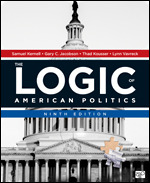Description
Solution Manual for The Logic of American Politics, 9th Edition, Samuel Kernell, Gary C. Jacobson, Thad Kousser, Lynn Vavreck ,
Table Of Content
Preface
A Note to Students
Chapter 1 • The Logic of American Politics
The Importance of Institutional Design
Constitutions and Governments
Collective Action Problems
The Costs of Collective Action
Representative Government
The Work of Government
Collective Action and America’s Constitution
Nota Bene
Key Terms
Suggested Readings
Review Questions
Part I: The Nationalization of Politics
Chapter 2 • The Constitution
The Road to Independence
America’s First Constitution: The Articles of Confederation
Drafting a New Constitution
The Fight for Ratification
The Theory Underlying the Constitution
Designing Institutions for Collective Action: The Framers’ Tool Kit
Assessing the Constitution’s Performance in Today’s American Politics
Key Terms
Suggested Readings
Review Questions
Chapter 3 • Federalism
American-Style Federalism
Federalism and the Constitution
The Paths to Nationalization
Modern Federalism
Evolving Federalism: A By-Product of National Policy
Key Terms
Suggested Readings
Review Questions
Chapter 4 • Civil Rights
What Are Civil Rights?
The Civil Rights of African Americans
The Politics of Black Civil Rights
The Legacy of the Civil Rights Movement
Challenging Tyranny
Key Terms
Suggested Readings
Review Questions
Chapter 5 • Civil Liberties
Nationalization of Civil Liberties
Writing Rights and Liberties into the Constitution
Freedom of Speech
Freedom of the Press
Freedom of Religion
Gun Rights
Criminal Rights
Privacy
Civil Liberties as Public Policy
Key Terms
Suggested Readings
Review Questions
Part II: The Institutions of Government
Chapter 6 • Congress
Congress in the Constitution
Congress and Electoral Politics
Who Serves in Congress?
Basic Problems of Legislative Organization
Organizing Congress
Making Laws
Evaluating Congress
Key Terms
Suggested Readings
Review Questions
Chapter 7 • The Presidency
The Historical Presidency
The Modern Presidency
Conclusion
Key Terms
Suggested Readings
Review Questions
Chapter 8 • The Bureaucracy
The Development of the Federal Bureaucracy
An Expanding Government
Bureaucracy in Action
Who Controls the Bureaucracy?
Bureaucratic Reform: A Hardy Perennial
Key Terms
Suggested Readings
Review Questions
Chapter 9 • The Federal Judiciary
Setting the Stage for Judicial Review
Three Eras of the Court’s Judicial Review
The Structure of the Federal Judiciary
Judicial Decision-Making
The Supreme Court’s Place in the Separation of Powers
Does a Politicized Judiciary Alter Separation of Powers?
Key Terms
Suggested Readings
Review Questions
Part III: The Public’s Influence on National Policy
Chapter 10 • Public Opinion
What Is Public Opinion?
Measuring Public Opinion
The Origins of Public Opinion
Is Public Opinion Meaningful?
The Content of Public Opinion
Effects of Background on Public Opinion
Public Opinion: A Vital Component of American Politics
Key Terms
Suggested Readings
Review Questions
Chapter 11 • Voting, Campaigns, and Elections
The Logic of Elections
The Right to Vote
Who Uses the Right to Vote?
Election Campaigns
The Logic of Elections Revisited
Key Terms
Suggested Readings
Review Questions
Chapter 12 • Political Parties
The Constitution’s Unwanted Offspring
Development and Evolution of the Party Systems
Revival of the Parties: A Sixth Party System?
Expediency Persists
Key Terms
Suggested Readings
Review Questions
Chapter 13 • Interest Groups
The Logic of Lobbying
The Origins of Interest Group Politics in the United States
Contemporary Interest Groups
What Do Interest Groups Do?
Interest Group Politics: Controversial and Thriving
Key Terms
Suggested Readings
Review Questions
Chapter 14 • Media
Development of the News Business
Legacy News as a Consumer Product: How the News Gets “Made”
Demand for and Effects of News
News Media as the “Fourth Branch”
Politician–Press Relations Then and Now
Key Terms
Suggested Readings
Review Questions
Part IV: Conclusion
Chapter 15 • Is There a Logic to American Policy?
Free Riding and Health Care
The Obstacles to Taking Domestic Action to Stop Global Climate Change
High-Stakes Maneuvering: Why We Tiptoe up to, but Have Not Fallen off, the Fiscal Cliff
The Prisoner’s Dilemma of Entitlement Reform
The Success and Failure of Collective Action: A Tale of Two Tax Reforms
Conclusion
Key Terms
Suggested Readings
Review Questions
Reference Material
Glossary
Notes
Index
About the Authors



Reviews
There are no reviews yet.